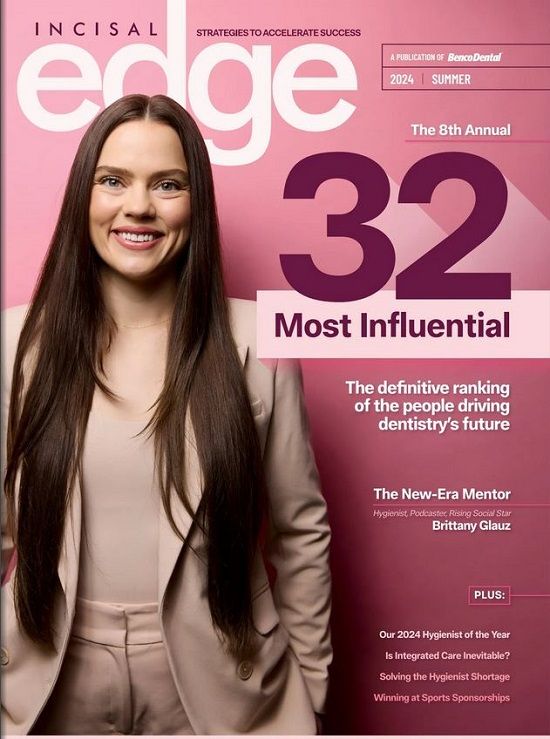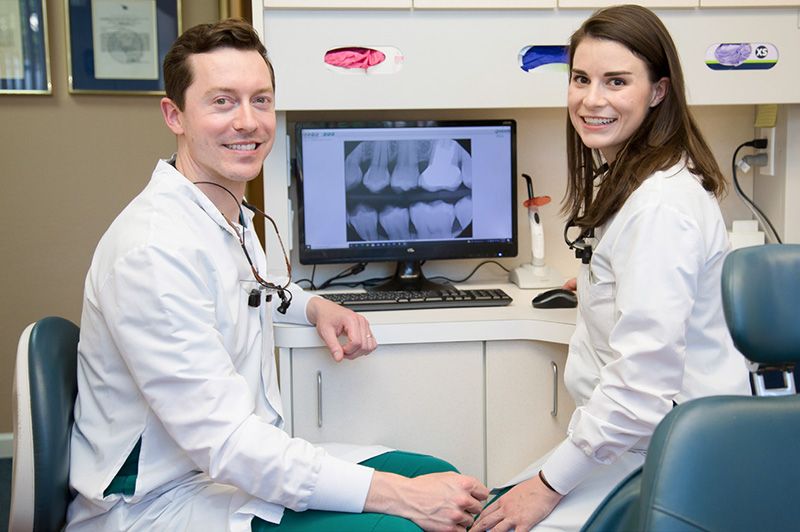A new generation of men is lining up with female leaders in supporting or equivalent roles.
That’s changing the way businesses are led, practices are managed, family responsibilities are divided, and spousal and parental relationships are navigated—especially within the American economic powerhouse that is family business. And guess who’s really killing it? Dental power couples.
IT’S 1984. Tony Micelli, a widowed former pro baseball player, is desperate to leave Brooklyn behind and give his precocious young daughter a more idyllic upbringing. So it’s off to Connecticut’s leafy suburbs, where, sight unseen, he has accepted work as a live-in housekeeper for a divorced high-powered advertising executive, Angela Bower, and her son. Crazy, right? I mean, can you imagine? That was the premise of Who’s the Boss?, one of the biggest TV sitcom hits of all time, running for eight seasons on ABC.
Dated though it may be, the show was progressive in one sense: Its comedy evolved to stem less from the role reversal and more from the contrasts between easygoing Tony and hard-driving Angela. Tony, in fact, is a sensitive guy who’s open to self-improvement and eager to make his new life work. The ostensibly better-educated, more-evolved Angela is the one who can’t fathom the arrangement, so much so that she almost sends him packing at first glance. “You’re the wrong sex,” she says. They eventually fall in love, of course—which isn’t entirely cool by today’s standards given that Tony is Angela’s subordinate, but it was the ’80s. We were still working this stuff out.
Apparently we still are.
We all like to believe that the rigidity of gender norms has broken down substantially since then, but by how much? Lingering vestiges of outdated and highly counterproductive thinking remain a drag on America’s work culture. It limits women who aspire to leadership roles. It also limits the men who, for one reason or another, aren’t working for them. It stunts progress and curtails outcomes anytime smart people have fewer opportunities to collaborate. But it also doesn’t have to be that way, as some family-run enterprises are proving every day, especially smaller ones like the three couple-run dental businesses we caught up with.

“We’re extremely fortunate to have a powerful strategic and leadership team made up of varied talents and perspectives,” says Julie Charlestein, the fourth-generation chief executive of Premier Dental and author of the Wall Street Journal bestseller How to Lead Your Family Business: Excelling Through Unexpected Crises, Choices and Challenges (Matt Holt, 2023).
Her company offers plenty of opportunities for men to work with female leaders: “Our CEO, EVP of revenue and data, VP of corporate and regulatory affairs and VP of new product development are all women.” Charlestein says diversity isn’t just good for business. “Our insights and perspectives, combined with those of our other colleagues, allow us to serve all members of the dental community.”
The broader picture in corporate America is different. Charlestein herself is something of an outlier, considering only about a quarter of all family businesses are headed by women. It’s clear that it requires more thoughtful leaders like her to drive change by keeping it top of mind, whether through more intentionally equitable and inclusive corporate governance or conspicuously living their own convictions.
Meanwhile, “Women in the Workplace,” the largest study on the state of women in corporate America, conducted by McKinsey & Company and LeanIn.Org, reports on a more insidious problem than women simply getting passed over for top jobs. The 2023 edition says the biggest barrier to advancement for women is actually the “broken rung,” the disparity between women receiving promotions versus men at the first step up to manager. “As a result of this broken rung,” the report states, “women fall behind and can’t catch up.”
Even encouraging signs in the corporate world can be less significant than they initially appear. For example, while the number of top executive positions held by women across all industries was still only 31.7% in 2021, according to U.S. Census data, that represents a five-point increase over 2015. Things are moving in a better direction, right? Yes and no. According to one analysis by a progressive Washington, D.C.-based think tank, there was pronounced stagnation throughout the 1990s and 2000s—two full decades—in both the percentage of women in top management positions and on corporate boards, as well as management jobs in general.
No wonder more women are taking matters into their own hands as entrepreneurs. And what about their startups and growing businesses, like the dental practices served by large companies like Premier? Are they perhaps nimbler and better able to embrace change? Are tinier headcounts and closer daily proximity actually breeding mutual respect that breaks down barriers more quickly? Are office politics different in closer quarters? Or are smaller businesses simply being practical and scrappy because there’s no time to get hung up on gender roles? The answers, at least from what we’ve seen, are mostly yes.
Business Unusual
In simpler times, a dentist’s office manager ran the day-to-day, and that person was always a woman. Today, even single-location practices are multimillion-dollar businesses with all the attendant complexities. Growth-oriented doctors who want to focus on leading the clinical charge and overall vision need more support than the traditional office manager role typically offered. That means having someone functioning as CEO, director of business development—maybe marketing manager as well—plus head of human resources and a few more roles. For DSOs and group practices, that’s no problem. But what if you’re an independent practice that can’t afford all that headcount? You’d need one hell of a jack (or jill) of all trades: the kind of person who is hard to find, someone who may not be a conventional candidate.
A 2023 study says the biggest barrier to advancement for women is actually the “broken rung,” the disparity between women receiving promotions versus men at the first step up to manager.
Jason Lewis would be perfect for the job: a successful Pittsburgh- area entrepreneur, executive, investor and business advisor. Except that’s not something he ever thought he’d consider.
In fact, he’d barely set foot in his wife’s practice, Terrific Teeth Pediatric Dentistry, until Covid hit. But the pandemic’s aftermath found his wife, Dr. Kelly Lewis, battling to reopen with the lone employee who returned after the shutdown. “I really needed
help,” Dr. Lewis says. “Like, desperately.” Jason started coming in every day to help manage the reopening and put systems in place. “We were both under the impression that this would be temporary,” he says.
“It forced us to really think: What’s best for us as a family? What’s best for our children? Are we going to go back into two different careers, where Kelly was going to run the business and I’m going to go off and chase this other opportunity? Or are we going to go all-in on this?”
—Jason Lewis
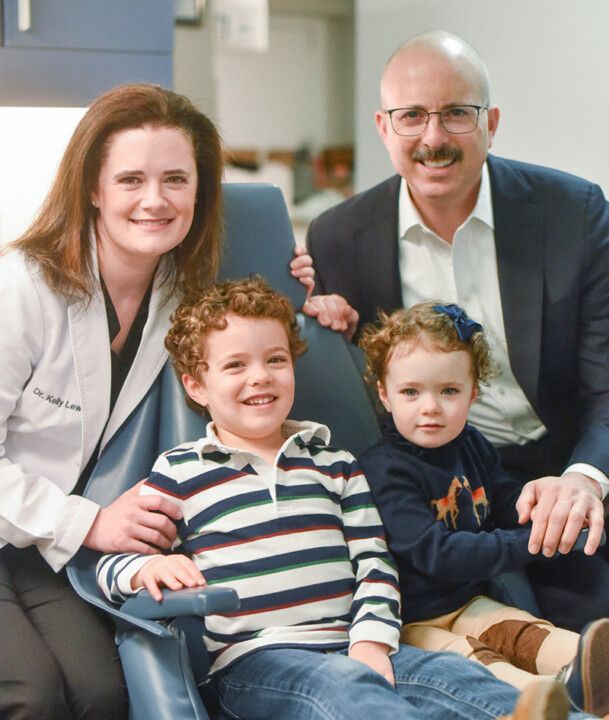
Dr. Kelly Lewis and her husband, Jason, with their children
Jason turned down several job offers during that time, until an especially tempting opportunity came along to run a company. “It forced us to really think: What’s best for us as a family? What’s best for our children? Are we going to go back into two different careers, where Kelly was going to run the business and I’m going to go off and chase this other opportunity? Or are we going to go all-in on this?”
Jason acknowledges that some men might harbor insecurities about going to work in their wife’s practice. Not him. Unsurprisingly, given the couple’s roll-up-the-sleeves attitude, it didn’t take long for the new working relationship to bear fruit. They’ve since had a second child, expanded their service offerings with help from an on-site orthodontist, hired another pediatric dentist and moved into a new, bigger office in a higher-traffic area. “It would’ve taken longer, a lot longer, if I was doing it all by myself, being a mother, with all those things pulling at you,” Dr. Lewis says. “Jason’s just so good at focusing on things that make the business better.” Working together, as it turns out, is great.
Scott Andersen is cut from a similar cloth as Jason Lewis: a former real estate developer, medical sales rep and past owner of a corporate training consultancy. Unlike Lewis, he wasn’t forced by circumstances to step in and help. He and his wife, Dr. Nicole Andersen, started Artisan Dental “as a from-scratch practice,” Scott says. However, very much like Lewis, he was unconcerned about being a layman cofounder of the Waunakee, Wisconsin–based practice. Far from it.
“I feel there is a wide range of creative potentials, synergies and opportunities for professional and personal growth individually and as a couple for spouses who are interested in working together,” he says. “Strong friendships can be deepened and broadened in the context of operating a business due to the abundance of opportunities to problem-solve, evolve ourselves and others, learn from mistakes and celebrate successes.”
Scott has since expanded the scope of his work from business development to what he calls “stakeholder stewardship,” through which he’s also in charge of making Artisan the most socially responsible business possible. As a result, the practice has been a Certified B Corporation since 2017, a recognition of companies that demonstrate leader-ship in the movement for a more equitable, inclusive and regenerative economy. In 2020, Artisan Dental announced it had also become the first carbon-neutral general dentistry practice in the United States. Proof positive that the right mix of complementary talents can take a practice to extraordinary places.
The Team-Dynamics
Doc Weighs In
Dr. Christine Kiesinger, an executive lead-ership coach and keynote speaker with 30 years’ experience teaching family and relational communication studies, most recently at George Washington Univer-sity, says couples like the Lewises and Andersens have cracked the code for “what it means to be in true partnership with a spouse—at work and at home. The Lewises understand the interdepen-dent link between work and home and have discovered that what is best for the family directly benefits the business.”
As a specialist in team dynamics, conscious communication, conflict and emotional intelligence, Dr. Kiesinger has seen a wide spectrum of professionals ranging from extremely dysfunctional to high-functioning. The secret to being the latter? She says “couples operating on a high level of what I call ‘relational intelligence’ are not afraid to ask: How do we each leverage our best talents and skills to experience wild success? As such, when we ask this question, culturally prescriptive pressures and expectations around gender roles diminish exponentially.”
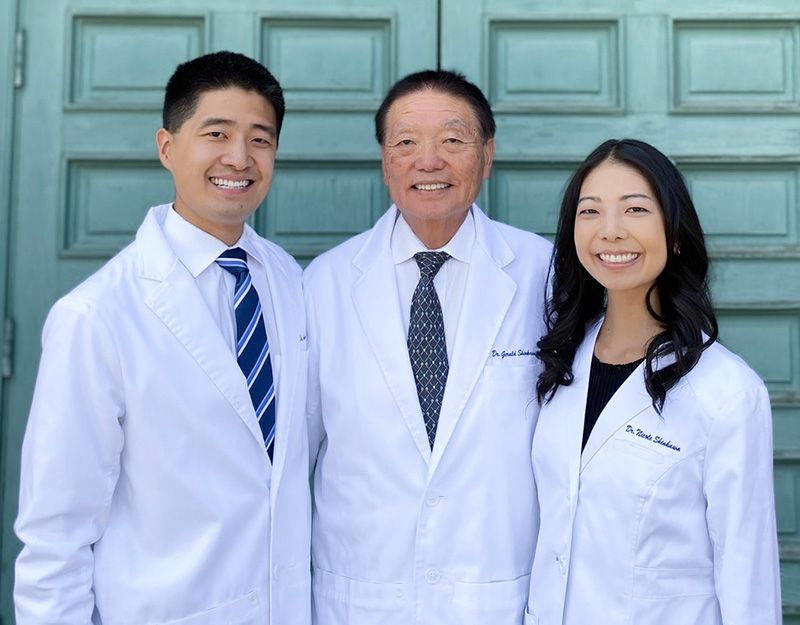
(From left) Drs. Adam, Gerry and Nicole Shinkawa
She also says stories like that of the Andersens are “aspirational” and can serve as a strong model for couples in similar situations. “One of the core qualities of high relational intelligence is the belief that our relationship with our significant other can be the foundation from which our individual and collective aspirations are realized. This is certainly true of the Andersens. Gender and spousal roles drop out of the picture.”
Succession
An increasing number of young female dentists are taking over their family’s practices. The Shinkawas’ will be co-run by two siblings without any predilection toward HBO-style drama.

On women taking over dentistry: “If we all work together, we can transform dentistry. Instead of having the scarcity mindset that we’re all in competition and there’s a constant fight for who gets a seat at the table, the new mindset [should be] that when women empower women, we make more space at the table entirely. There is no limit to the number of women who can be dentists.”
On the transition timeline: “My dad loves to work at the office, but I know he’s looking forward to the day when he’ll be able to turn over the major responsibilities to my brother and me. My dad will forever be at the office, either working part-time or even as our office greeter.”
On how responsibilities are divided (now): “My dad has been slowly training my brother and me on the business aspect of dentistry so we know what to expect when we do take over. Ultimately, my dad has the final say, but he has an open mind about listening to our ideas.”
On how responsibilities will be divided (someday): “It’s nice to share the workload with my brother because we balance each other out. I enjoy managing workflow, monitoring employee performance, building and maintaining our brand and looking for ways to grow the practice. My brother is a mathematician and does a lot of financial management and organization.
If we face challenges, we try to set our emotions aside and do what’s best for the practice.”
On her advice for other young doctors joining their family’s practice: “Make it happen! There will always be an opportunity to branch out and build your own practice if you eventually decide to do so. But having the experience with a family member you trust will lay a strong foundation to learn and grow.”
On her father’s influence: “He has taught me so much. I will always look up to my dad as my inspiration to follow my passion and work hard. He has so much experience. I know I can always ask him for help if I need it.”
Dividing, Sometimes
Disagreeing, but Conquering
While rejecting retrograde notions of what gender roles mean in both business and marriage is a prerequisite for couples building a business together, there must be a collaboration plan for it to work long-term. Dr. Sarah Blair and her husband, Mark Ketterhagen, founded Indie Practices, a virtual dental coaching business focused on leadership and practice growth. Dr. Blair is a former practice owner, while Ketterhagen was a school principal with a master’s in educational policy and leadership from Marquette. They left nothing to chance when partnering up. “Even though there are only two of us as the cofounders/owners, we’ve outlined our roles and responsibilities in writing,” Dr. Blair says. “We’ve agreed upon our core values, mission, quarterly goals and longer-term objectives in advance. When we’re faced with tough decisions or exciting new opportunities, we can refer to the plans we’ve already made to see how new items fit in.”
Their approach to working with clients also splits accor-ding to their strengths. “I provide the coaching sessions on clinical topics and practice management systems, while Mark coaches primar-
ily on leadership and team culture,” Dr. Blair says. The two halves make a highly productive whole for their clients. “Without strong leadership and a healthy team culture [at dental practices], you could have the greatest systems and clinical skills around and still not have a successful business. Together, we’re able to speak to most aspects of creating and growing a dental practice.”
“All too often,
couples stumble into their marriages and business partnerships absent intentional interpersonal dialogue, and then wonder how things devolve so quickly.”
—Dr. Christine Kiesinger
Dr. Kiesinger, the leadership coach, says Dr. Blair and Ket-terhagen illustrate “the power of interpersonal intentionality and the role it plays in building and sustaining both a marriage and a business.” It is, however, something that takes hard, often uncomfortable work in confronting potential conflicts. “All too often, couples stumble into their marriages and business partnerships absent intentional interpersonal dialogue, and then wonder how things devolve so quickly. Intentional dialogue bravely and honestly explores both the possibilities and the pit-falls of this couple’s arrangement and proactively helps them create plans to keep things moving forward.”

Mark Ketterhagen and his wife, Dr. Sarah Blair
Dr. Andersen says she and husband Scott “definitely need to divide and conquer just based on a large majority of my day being spent clinically. We overlap for meetings and decision making. Of course, there is quite a bit of daily runover in the evenings to catch up on the business side of things.” Scott says he views disagreements not as a stress-or or disruption, but rather “an opportunity to explore the pros and cons of an idea from more perspectives. In our case, our first level of analysis includes evaluating the implications for serving our stakeholder groups.” Dr. Andersen says there’s also a Plan B for times when a tiebreaker is needed. “We rely on our leadership team at the office to voice their ideas, which many times takes us in an entirely better direction. After presenting our points and letting it digest for a few days, we generally can come to the better decision for all.”
Dr. Lewis says part of working together with her husband means managing his hard-driving workaholic tendencies. “My brain never shuts off. All I want to do is talk about work all the time,” Jason admits. Turning to him, Dr. Lewis says, “I think sometimes I have to remind you that it’s just time to shut that part down for the evening.” Because Jason joined the practice while it was already in motion.
An Officer and a Dentist
From navigating Army dentistry as a female officer to partnering with her husband in practice ownership, Dr. Maddie Driskill has stories to tell—and advice on what to expect.
THE ARMY SEEMS like a lonely place for a woman. It’s an overwhelmingly male branch, with females making up just 15.7 percent. Only about 10 to 20 percent of officers are women, with the numbers shrinking as ranks ascend. Clearly, a female officer is going to find herself outranking, and in some cases commanding, a large number of men. But Dr. Maddie Driskill’s experience as an Army dentist was largely positive—with some caveats.
Old Army, New Army
Perhaps surprising to those without firsthand experience, she says rank isn’t as big an issue when it comes to health care providers. “If you do the HPSP [Health Professions Scholarship Program] scholarship, you enter as a second lieutenant, but then you’re immediately promoted to captain. My colleagues were also captains, and we worked with a lot of civilians we weren’t in charge of at all.”
Still, the service did exhibit some lingering bias. “The biggest issue I had was that people were used to being told what to do by men.” She’s skeptical whether that’s all that different from the outside world, though. And despite that, throughout her six years, Dr. Driskill says she didn’t confront oppressive sexism even as she ascended to the rank of major. “I had a good experience in the dental corps. But I’m also fairly assertive.” Knowledge and experience trumped rank when it came to matters outside formal military hierarchies. “I felt like my commanders listened to me and trusted me.”
Joining Forces
At the time, Dr. Driskill was engaged to Dr. David Valenta. He’s now her husband and equal partner in Spruce Dental, their recently purchased and revamped practice in Colorado Springs, with a team of 21. The couple met while Dr. Valenta was completing his general practice residency at York Hospital in Pennsylvania and Dr. Driskill was completing an externship. Thus began a path that eventually led them to put down roots in the Centennial State.
“You don’t really have much control over where you
go,” Dr. Driskill says of Army life. After practicing at Fort Carson in Colorado, she was stationed in South Korea; she and Dr. Valenta married just before she shipped out. “We were faced with this decision either to spend our first year of marriage not just apart but separated by something like a 15-hour time difference. Ultimately, we decided he would come to Korea.” Dr. Valenta ended up postponing his career for a year. “We got to travel to places like New Zealand, Thailand and Japan. In hindsight it was great.”
Opening New Doors
Reflecting on leaving the Army to become a civilian den-tist, Dr. Driskill says that “from my experience, more men stay in the Army as dentists than women do,” adding that “my theory is it’s because it’s more expected that women stop working to support their husbands, whereas men have their own careers. And if the man has a career, it’s hard for him to move around every three years.”
This reminds her of a powerful benefit for the family of an Army dentist. “I wanted to get pregnant and have a baby in the Army, because I think you get three, maybe four months’ paid maternity leave.” Unfortunately, it didn’t work out as planned, but the couple is now successfully balancing their lives as business partners and busy parents. “I work Wednesdays and Fridays, and I’m with the baby Mondays, Tuesdays and Thursdays. Eventually, we’d like to be at three clinical days each.”
Finding Their Balance
Despite the current state of flux familiar to any working parents, the two doctors seem to have their relationship as practice owners figured out. “We disagree on a lot of stuff, but we’ve aligned where it’s most crucial: on our clinical philosophy and our treatment planning philosophy,” Dr. Driskill says. There are even some built-in checks and balances due to their personality differences. “David’s the dreamer. I’m the dream killer,” she jokes. “Actually, I’m glad he likes to think big and without limits. My role is to be there to rein him in a little.” So, yes, there’s talk of expanding the practice, perhaps to multiple locations, and maybe another child. Does some of the military discipline she experienced help her manage it all these days? “Well, I learned a ton [in the Army],” she says.
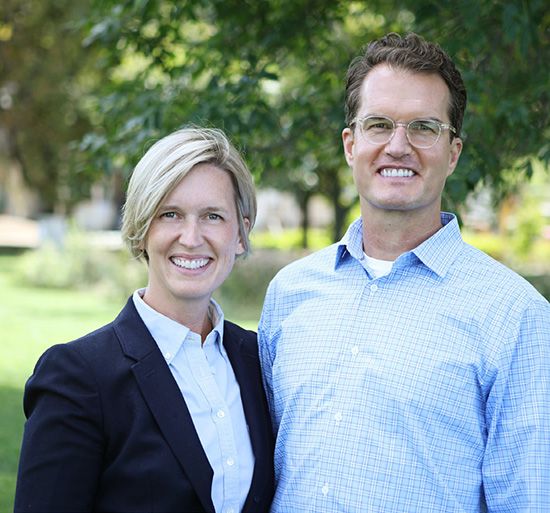
Dr. Nicole Andersen with her husband, Scott
There will always be normal couple things and normal business things to contend with. That’s expected. Not everything, however, is so easily predictable. While Jason Lewis says he loves “doing all the stuff no one else wants to do” at the practice and “wouldn’t have it any other way,” he does admit struggling a little when it comes to one thing. “If I’m being candid, one person in a family has to be the primary parent, and in this case, it has to be me, which goes against the way I’m wired. I always want to keep going and going. And when something happens with one of the kids, I have to force myself to hit pause on the machine and go deal with it. Kelly can’t. She has patients to care for. It causes some internal conflicts sometimes.”
Says Dr. Lewis, “It’s almost the exact opposite for me. It’s hard that I can’t drop everything if the kids get sick or there’s an emergency. I want to be with them. Let’s face it, unless they’re in the hospital, there’s no way I’m taking a day off. Not every patient can even be rescheduled; some of them have serious needs that have to be addressed.” Even for a couple who really has it together, this is a tough one—something they have to make the best of while working through it. “We both feel that same tension, just in different directions,” Jason says.
A Wave of Female Entrepreneurs
Which industry will make the most revolutionary impact on family businesses in our generation? That’s harder to say now that constant disruption is becoming the rule. Artificial intelligence will surely have enormous influence, though what kind is currently anyone’s guess. Surely dentistry, though, is poised for a dramatic demographic transformation. With thousands of Boomers hitting retirement age every day, the mostly male practice owners and business leaders of the past are stepping aside. This coincides with enrollment numbers at America’s dental schools tipping decisively in favor of women.
On top of that, “Women in the Workplace,” the McKinsey/ LeanIn study, debunks the myth that women are becoming less ambitious. In fact, they’ve become even more ambitious since the pandemic. Since family businesses represent the vast majority of American enterprises and are responsible for somewhere between half and two-thirds of employment, this is important stuff that signals considerable change to come.
While female employees at big businesses still bear the brunt of gender discrimination, female dentists are sidestepping workplace limitations by opening their own businesses, being their own bosses, partnering with their spouses and setting the stage for a shift that could see dentistry become the next traditionally male industry dominated by women. Will business-minded couples with complementary backgrounds, like those featured here, grow in both number and stature to become a force moving the needle? Dr. Kiesinger, the leader-ship coach, doesn’t rule it out. “There’s so much possibility and potential in spousal business partnerships when we’re willing to transcend more traditional notions of gender, spousal, marital and parenting roles and expectations.”

“There’s so much possibility and potential in spousal business partnerships when we’re willing to transcend more traditional notions of gender, spousal, marital and parenting roles and expectations.”
—Dr. Christine Kiesinger
